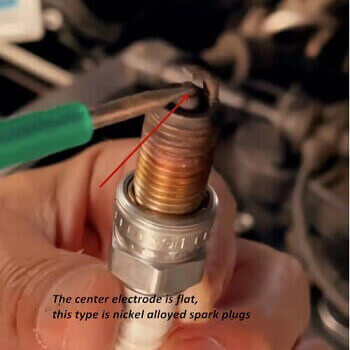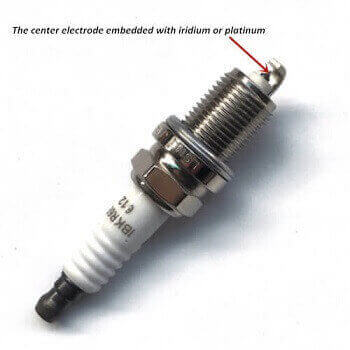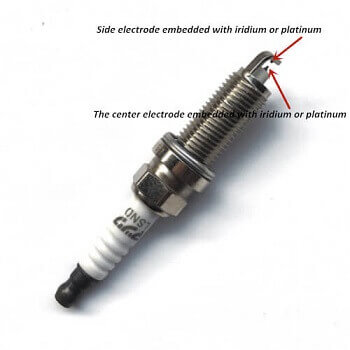How often should car spark plugs be replaced? There are many factors affecting the spark plug replacement interval. Generally speaking, there are 3 conditions:
1) Ordinary copper and nickel spark plugs ( or standard spark plugs) should be replaced every 20,000 to 30,000 kilometers.
2) Platinum and iridium spark plugs are suggested to change every 50,000 to 60,000 kilometers unless otherwise noted.
3) Double platinum and double iridium spark plugs to be replaced every 80,000 to 10,000 kilometers. But if they are applied to vehicles with turbocharger, to check every 20,000 or 30,000 kilometers is suggested.
Now let's take a look at these different kinds of spark plugs.

The price of this type of spark plugs is relatively cheap. It is usually equipped on the vehicles with less than 80,000 yuan (around $12,000) or small SUVs without turbocharger.

Platinum spark plug or iridium spark plug, its center electrode is pointed and embedded with platinum or iridium. This type can be used on both supercharged engines and naturally aspirated engines. If it is used on supercharged engines, its service life is 20,000 to 30,000 kilometers. If on naturally aspirated engines, 50,000 to 60,000 kilometers is suggested.

The third type is that the center electrode and the side electrode are both embedded with iridium or platinum, which is called double iridium or double platinum spark plugs. Generally, the quality is much more better, so is the price. This kind of spark plugs will much better improve power, reduce fuel consumption and solve shaking.
Besides the mileage and spark plug types, there are also some other factors that affect the spark plugs replacement cycle as following:
Driving Conditions: Your driving habits and conditions also affect spark plug longevity. Frequent stop-and-go driving, heavy loads, and idling can wear down your spark plugs faster. Conversely, highway driving at steady speeds is gentler on them.
Engine Performance: Pay attention to your engine's behavior. A misfiring engine, reduced fuel efficiency, difficulty starting, or rough idling could indicate worn-out spark plugs. Regularly checking for these signs can prompt you to replace the plugs at the right time.
Manufacturer's Recommendations: Your car's manufacturer provides valuable guidelines in the owner's manual. These recommendations are tailored to your specific vehicle, helping you make informed decisions about replacement intervals.
We can also remove the spark plug and check the gap between the two electrodes. The standard gap is from 1.0 to 1.3 mm. If the gap is over that range, the spark plugs need to be replaced immediately. If not replaced, it will have a great impact on power and fuel consumption.
Remember, the nickel alloyed spark plugs can never been installed in turbocharged cars, because the temperature in the cylinder of turbocharged vehicles is as high as 2500 degrees, and the high temperature resistance of nickel is less than 1400 degrees. If you use nickel alloyed spark plugs, the electrodes will be easily ablated and broken, falling into the cylinder, and cause a great damage to the engine.
1. There is obvious frustration when the vehicle is started.
The normal vehicle startup process is very smooth, but if the spark plug fails, the ignition process will become very difficult, and the vehicle will have obvious vibration and frustration when starting. If your vehicle has a noticeable jerk when starting, and the vehicle keeps roaring but won't ignite, it could be a problem with the spark plugs.
2. The engine shakes during driving.
The vehicle will not vibrate too much during normal driving, unless the three-cylinder engine will vibrate slightly when it is idling. If the vehicle shakes unexplainedly during driving, and the cause of carbon deposits in the engine is ruled out, it may be a problem with the spark plug. If there is serious carbon deposition in the spark plug, the power of the vehicle will be strong and weak at times, and the feedback to the vehicle body is that the vehicle body shakes continuously during driving.
3. Sudden increase in vehicle fuel consumption
The spark plug is not only related to whether the vehicle can ignite, but also affects the sufficiency of fuel. If the spark plug fails, the gasoline cannot be fully burned, and the power performance of the vehicle will not only decrease, but also increase the fuel consumption of the vehicle.
If you find that the fuel consumption has inexplicably increased, and you can't find the reason after checking, you can check the spark plug.
The quality of the spark plug directly determines the combustion efficiency and combustion state of the engine. Therefore, when your car reaches the certain kilometers to be replaced, or the engine vibrates, fuel consumption becomes higher, or power becomes weak, you need to check the spark plugs first.